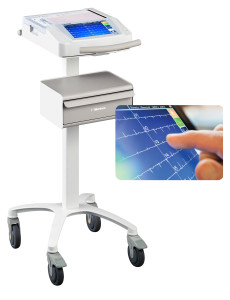 When it comes to medical devices and bacterial cross-contamination, what is the medical device manufacturer’s role in helping to protect our customers and their patients? Researchers have discovered that the three bacteria most commonly found in hospital environments – including two that are resistant to antibiotics – can survive on keyboards and keyboard covers used in clinical areas. 1 Environmental surfaces in the healthcare environment serve as reservoirs for microorganisms, which can cause infection in patients and healthcare workers due to cross contamination. Computer keyboards, in fact, are some of the most dangerous. Research shows that computer keyboards can support bacterial growth for up to 24 hours. 2
When it comes to medical devices and bacterial cross-contamination, what is the medical device manufacturer’s role in helping to protect our customers and their patients? Researchers have discovered that the three bacteria most commonly found in hospital environments – including two that are resistant to antibiotics – can survive on keyboards and keyboard covers used in clinical areas. 1 Environmental surfaces in the healthcare environment serve as reservoirs for microorganisms, which can cause infection in patients and healthcare workers due to cross contamination. Computer keyboards, in fact, are some of the most dangerous. Research shows that computer keyboards can support bacterial growth for up to 24 hours. 2
Given that so much patient care now takes place in the outpatient environment, and many medical procedures previously done in the hospital now occur in the office space, it’s reasonable to be concerned about the contamination risks of physician offices and ambulatory surgery centers. Reducing cross contamination within healthcare environments requires continuous, careful evaluation of clinical procedures and the use of medical equipment in that space. And that’s where Mortara comes in. With solution-based, thoughtful product design, medical equipment manufacturers can play an important role in helping to reduce the risks posed to caregivers and patients alike.
As a leading developer and manufacturer of innovative medical devices, Mortara – the company that proudly brings you Burdick products – recognizes that medical equipment harboring dangerous bacteria is a major contributor to the problem. We continuously work to find new and inventive ways of combating this dilemma. Most recently, Mortara Instrument introduced a series of electrocardiographs and patient monitors with easy-to-clean work surfaces and fewer places for bacteria to reside. Our Burdick ELI™ 280 ECG, Surveyor™ S12 and S19 Patient Monitors, all with touchscreen interfaces, feature smooth work surfaces that are easier to clean than traditional keyboards and work surfaces with knobs, buttons, seams and crevices.
Educate clinicians
Distributor reps have a role in the infection control cause, too. Reps can educate clinicians about the benefits of touch-screen technology, create awareness that such technologies exist, and ask thoughtful, probing questions such as these:
- “What steps do you currently take to prevent bacterial cross-contamination within your office/space?”
- “Do your current medical devices adequately fit into your infection control strategies?”
- “Would an ECG or patient monitor with easy-to-clean surfaces help you meet your goals?”
For more information on this important topic contact your Burdick rep today at 1-800-231-7437.
1The Texas Department of Insurance, Division of Worker’s Compensation (TDI, DWC) HS05-036B (8-07)
2Nurse Leader Insider, MRSA Can Hide Out in Hospital Keyboards, August 5, 2005, HCPro, Inc. Adapted from Briefings on Infection Control (August 2005).
Editor’s note: Sponsored by Mortara Instrument Inc.